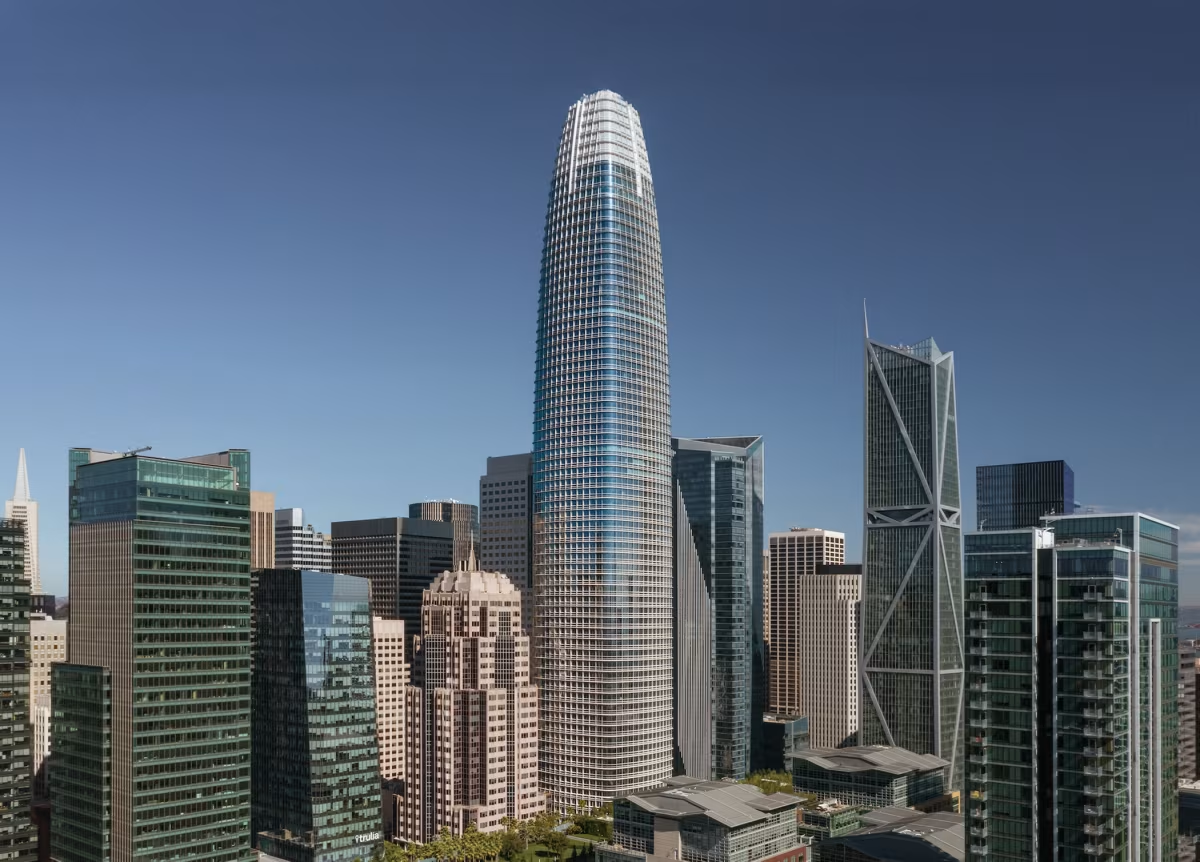Salesforce Tower vs Salesforce Tower


Comparing the Salesforce Tower and the Salesforce Tower is an interesting exercise, because even though they are located in different cities (San Francisco, CA and Chicago, IL), both were designed by Pelli Clark & Partners and finished within within 5 years of each other. This gives us the chance to see how the same architect's ideas were expressed in different urban contexts almost simultaneously.
Height & Size
The Salesforce Tower is clearly the larger tower of the two, both in terms of height and number of floors. It rises to 1070ft (326m) with 61 floors above ground, while the Salesforce Tower reaches 817ft (249m) with 57 floors above ground.
Despite being taller and having more floors, Salesforce Tower has less total built-up area than Salesforce Tower.
Of course, each project may have faced different briefs or regulatory constraints, which we don't really know about and could also explain the outcome.
Architectural Style
Both the Salesforce Tower and the Salesforce Tower were designed in line with the aesthetic conventions of the Contemporary style.
At the time, this style was at the height of its popularity. So Pelli Clark & Partners followed what was in many ways expected at the time, producing designs that fit comfortably within contemporary architectural norms rather, than breaking with convention.
Uses
Both the Salesforce Tower and the Salesforce Tower were designed to serve as commercial towers, and that has remained their main use since their completion, serving similar roles in the urban fabric.
Structure & Facade
The two towers rely on different structural systems, reflecting distinct engineering strategies.
The Salesforce Tower uses a Framed Tube In Tube structural system, which combines a strong central core with a perimeter tube of columns, while the Salesforce Tower uses a Frame system, that relies on a regular grid of columns and beams to sustain its weight.
Yet, when it comes to their facade, they both employed the same solution, a Curtain Wall facade.
A curtain wall is a non-load-bearing facade hung from the structural frame. It is anchored to floor slabs and transfers only its own weight and wind loads, allowing for sleek, glassy exteriors.
| Salesforce Tower | Salesforce Tower | |
|---|---|---|
| Pelli Clark & Partners | Architect | Pelli Clark & Partners |
| 2005 | Design Ended | 2020 |
| 2013 | Construction Started | 2020 |
| 2018 | Year Completed | 2023 |
| Contemporary | Architectural Style | Contemporary |
| Commercial | Current Use | Commercial |
| 61 | Floors Above Ground | 57 |
| 3 | Floors Below Ground | 4 |
| 326 m | Height (m) | 249 m |
| 130064 | Built-up Area (m²) | 134709 |
| 34 | Number of Elevators | 30 |
| Framed Tube In Tube | Structure Type | Frame |
| Steel | Vertical Structure Material | Steel |
| Reinforced Concrete | Horizontal Structure Material | Poured Concrete Over Metal Decking |
| No | Facade Structural? | No |
| Glass, Metal | Main Facade Material | Steel, Glass |
| Clark Constrruction, And Hathaway Dinwiddie Joint Venture | Main Contractor | Walsh Construction |
| Boston Properties, Inc., And Hines Interests Limited Partnership | Developer | Hines |
| WSP Group | MEP Engineer | Alvine Engineering |
| Magnusson Klemencic Associates | Structural Engineer | Magnusson Klemencic Associates |
| CA | State | IL |
| San Francisco | City | Chicago |
| 415 Mission Street | Address | 333 West Wolf Point Plaza |